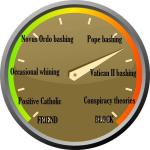
[See the review at Amazon. Here the original italics are restored and I have added links and indentation for citations.]
“Peeling an Onion”: Lawler Fails to Prove His Case
Phil Lawler was kind enough to send me a review copy of his book. In the Introduction he described Pope Francis and his opinions as follows:
leading the Church away from the ancient sources of the Faith. . . . radical nature of the program that he is relentlessly advancing. . . encouraged beliefs and practices that are incompatible with the prior teachings of the Church. . . . a Roman pontiff who disregarded so easily what the Church has always taught and believed and practiced on such bedrock issues as the nature of marriage and of the Eucharist . . . a danger to the Faith . . .
These are extraordinary claims, that certainly need very strong demonstration. The problem with the book is that the undeniable proof never came. Thus, reading it reminded me of peeling an onion and eventually discovering that it has no core (unlike an apple), or finding a treasure chest that contains nothing.
Lawler in the Introduction cites the pope’s homily from 24 February 2017 as, in effect, his final straw. He reports that “Something snapped inside me” after reading what he construes as the Holy Father’s capitalizing on “one more opportunity to promote his own view on divorce and remarriage.” He concluded:
[I]n this case, the pope turned the Gospel reading completely upside-down. . . . I found I could no longer pretend that Francis was merely offering a novel interpretation of Catholic doctrine. No, it was more than that. He was engaged in a deliberate effort to change what the Church teaches.
The homily was one of many of Pope Francis’ characteristic condemnations of legalism and “casuistic logic.” Jesus and Paul both strongly opposed the same thing. The point he’s making is that Jesus didn’t approach the question from merely a legal standpoint, which is how His critics were approaching it. They were doing their usual “straining at gnats” routine and missing the “weightier matters” about marriage and divorce.
Jesus went much more deeply into the matter, telling them that God only allowed divorce at all because of their hardness of heart. The pope, too, was trying to bring out the deeper meanings of the passage.
If Lawler claims that the pope has now denied the indissolubility of marriage, then his intellectual burden is to find direct passages where the pope did that. But he did no such thing. Therefore, I went and did his work for him, and easily found four disproofs of his negative assertion (all available online):
- “Francis affirms indissolubility of marriage, objectivity of annulment conditions” (Catholic News Agency / The Catholic World Report, 1-23-16). Lawler himself was editor of this magazine from 1993 to 2005.
- “Pope Francis Reaffirms that Catholic Marriage is Indissoluble” (John Burger, Aleteia, 9-30-15)
- “‘Amoris Laetitia’: A Hymn to Indissolubility and Fidelity” (Deacon Nick Donnelly, National Catholic Register,4-20-16)
- “Pope emphasizes ‘indissolubility of Christian matrimony’” (Catholic News Agency, 4-25-14)
*
This is documentation of what the pope actually holds: not a mere argument from silence (“the pope didn’t assert particular Catholic teaching x in papal homily y; therefore, he must deny it, and wants to change x and constant Church tradition in general”). That won’t do.
In Chapter Two Lawler takes on the pope’s famous statement with regard to homosexuality: “who am I to judge?” (made to reporters in Brazil in July 2013). Lawler opines: “the pope’s statement seemed to suggest that the Church should move away from its clear and constant teaching that homosexual acts are gravely immoral.”
In this instance, the pope’s words were taken wildly out of context by the media. Lawler – as a veteran journalist — could certainly have figured that out. This is the “proof” he offers for Pope Francis being soft on homosexuality. Once again, he couldn’t trouble himself to look up what the pope has said and done about the issue elsewhere. The facts are these:
- Pope Francis opposed so-called “gay marriage” in a Slovakian referendum in February 2015.
- He did the same in December 2015 as regards Slovenia.
- In January 2015, the pope visited the Philippines and stated: “The family is also threatened by growing efforts on the part of some to redefine the very institution of marriage, by relativism, by the culture of the ephemeral, by a lack of openness to life.”
Terrible, dangerous, anti-traditional stuff there, huh? Laurie Goodstein, a Jewish writer for the New York Times understood what Pope Francis believes about homosexuality better than longtime Catholic journalist Phil Lawler. She wrote (7-28-15): “there is also plenty of evidence that Pope Francis stands firmly on church teachings on the traditional family and opposing same-sex marriage.”
A third instance (still in Chapter Two) is even poorer “reasoning”. It involves a 92-year-old atheist journalist who is in the habit of paraphrasing the pope’s words after the interviews he does with him.
Apparently, he has terrible lapses of memory or is deliberately deceiving his readers, since (again) the pope’s utterances elsewhere show that he believes the contrary of what he supposedly “expressed.” In Chapter Two, p. 20, Lawler writes:
In March 2015, the talkative pope again spoke with [Eugenio] Scalfari for La Repubblica. This time Francis—at least as interpreted by his favorite interviewer—appeared to cast doubt on the existence of hell.
Scalfari (as reported by Sandro Magister in L’Ezpresso Magazine, 10-27-17), also thinks that the pope has denied the existence of heaven and purgatory, too. Right.
And sure enough, for the third time, Lawler doesn’t make the slightest effort to do the necessary research and see what the pope actually states elsewhere about the topic under consideration. It’s not hard to find:
1. Pope Francis strongly asserted belief in hell in a homily of 11-12-16.
2. Talking in March 2014 to about 900 relatives of victims of the Italian mafia, the Holy Father addressed the mobsters as follows:
This life that you live will not give you joy or happiness. Convert, there is time before you finish up in hell, which is what awaits unless you change path.
“Hellfire and brimstone” preaching from a pope who supposedly denies hell? Once again, Catholic Phil Lawler is out to sea, despairing of the pope’s eschatology, yet Jewish talk show host Dennis Prager rapturously praised the pope for strongly asserting the doctrine of hellfire and judgment (National Review, 3-25-14). What is this: alternate universes?
3. Pope Francis again issued a rather striking challenge to the wealthy who exploit or ignore the poor, in his annual Lenten message, written on 10-4-15:
[T]he danger always remains that by a constant refusal to open the doors of their hearts to Christ who knocks on them in the poor, the proud, rich and powerful will end up condemning themselves and plunging into the eternal abyss of solitude which is Hell.
We have to be on-guard against terrible “liberal / heterodox” preaching like that!
4. Pope Francis was in Fatima on 5-13-17 and stated that the Blessed Virgin Mary “foresaw and warned us of the risk of hell where a godless life that profanes Him in his creatures will lead.”
Lawler also engaged in a rather “inventive” interpretation of another homily and made out that Pope Francis questioned whether St. Peter and St. James were “believers.” To state the charge is its own refutation. Here is the exact quote:
[H]e appeared to suggest that the early Church leaders who disagreed with St. Paul on the enforcement of Mosaic Law— including St. James and, before the Council of Jerusalem, which settled the question, even St. Peter himself—“were not believers.
I showed at length elsewhere how this is a completely ridiculous interpretation of what Pope Francis asserted in a homily dated 5-19-17.
This is the sort of “D+ in debating class” argumentation we find again and again in the book. Phil Lawler and legions of papal critics are perfectly sincere and well-meaning (I freely grant), but that doesn’t free them from the responsibility of (at the very least) providing solid evidence in their critiques.
Most of the book was actually taken up with gossipy, National Enquirer-like “palace intrigue” and internal affairs of Cardinals and the Curia, and what Karl Keating in his glowing Facebook review called “administrative or leadership style and actions” of the pope, etc. Cardinal Gerhard Ludwig Müller commented on this sort of thing in an interview in National Catholic Register (10-9-17):
The Gospel and the words of Jesus are very strong against those who denounce their brothers and who are creating this bad atmosphere of suspicion. I’ve heard that nobody speaks; everyone is a little afraid because they can be snitched on. It’s not the behavior of adult people, but that of a boarding school.
That hits the nail on the head. I’ve never had the slightest interest in such things (I don’t watch soap operas). I was specifically looking to see how Phil would back up the extraordinary claims made in the Introduction.
In my opinion, he has absolutely failed to demonstrate that Pope Francis is deliberately trying to subvert or overthrow Catholic tradition. That hasn’t been even remotely proven in this book.
There were insinuations here and there that the pope is talking out of both sides of his mouth and being two-faced: not saying what he “really” means. But anyone can say that about any person at any time and attempt to “prove” any theory whatever. That would be like saying, “Armstrong really loves Lawler’s book. He’s just saying the opposite to fool all of us.” Personally, I prefer hard facts, not “jesuitical” conspiracy theories.
It was heartening, however, in the sense that if this is considered the best shot against the pope, then the fashionable “Francis is a heterodox bad pope” opinion indeed lacks a demonstrable basis.
***
See my original five in-depth reviews, from which most of this was drawn:
Also:
*
***
Photo credit: photograph by torbakhopper (5-29-15) [Flickr / CC BY-ND 2.0 license]
***













